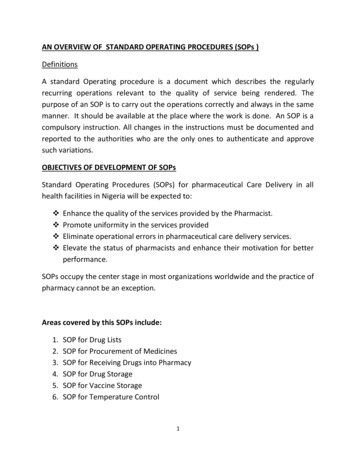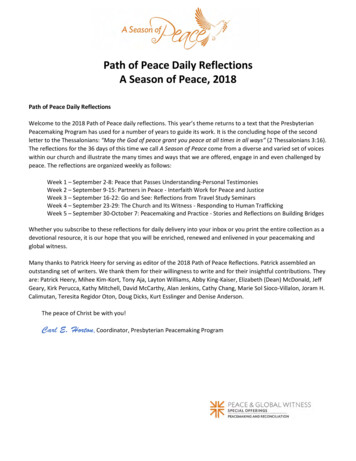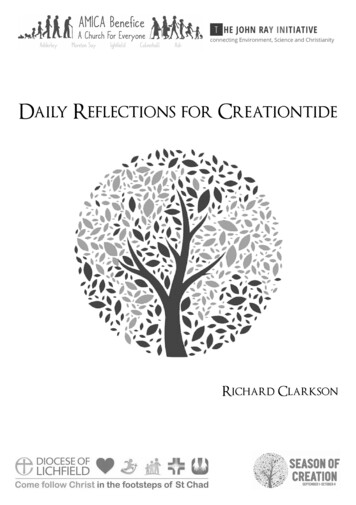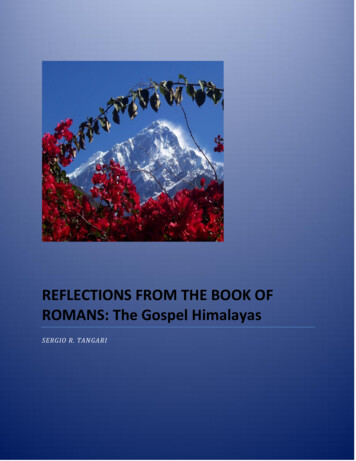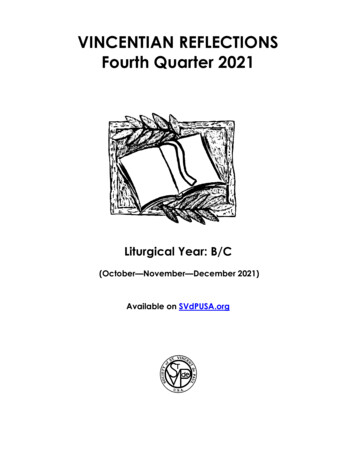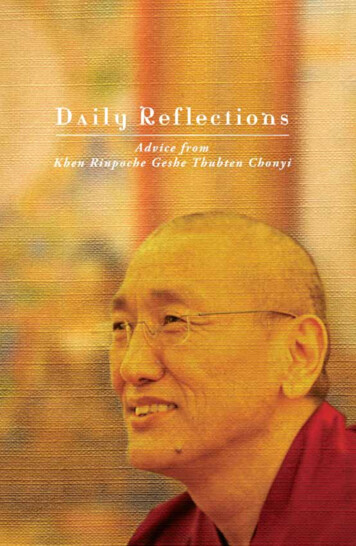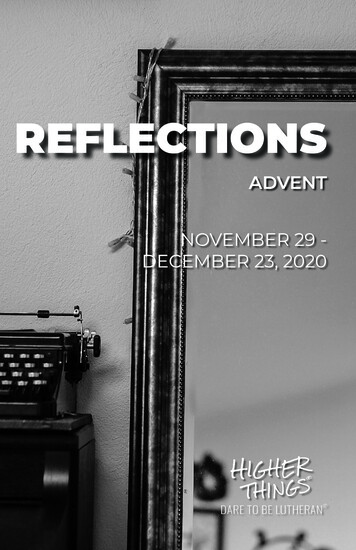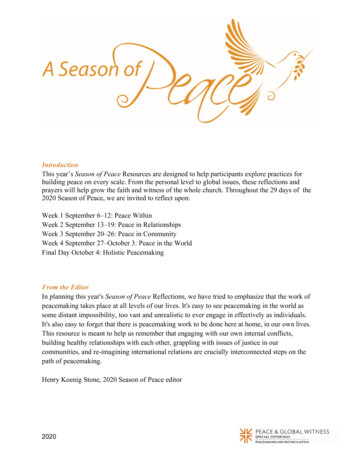
Transcription
IntroductionThis year’s Season of Peace Resources are designed to help participants explore practices forbuilding peace on every scale. From the personal level to global issues, these reflections andprayers will help grow the faith and witness of the whole church. Throughout the 29 days of the2020 Season of Peace, we are invited to reflect upon:Week 1 September 6–12: Peace WithinWeek 2 September 13–19: Peace in RelationshipsWeek 3 September 20–26: Peace in CommunityWeek 4 September 27–October 3: Peace in the WorldFinal Day October 4: Holistic PeacemakingFrom the EditorIn planning this year's Season of Peace Reflections, we have tried to emphasize that the work ofpeacemaking takes place at all levels of our lives. It's easy to see peacemaking in the world assome distant impossibility, too vast and unrealistic to ever engage in effectively as individuals.It's also easy to forget that there is peacemaking work to be done here at home, in our own lives.This resource is meant to help us remember that engaging with our own internal conflicts,building healthy relationships with each other, grappling with issues of justice in ourcommunities, and re-imagining international relations are crucially interconnected steps on thepath of peacemaking.Henry Koenig Stone, 2020 Season of Peace editor2020
Sunday, September 6, 2020Peace WithinCasting Out Demons in the MirrorHenry Koenig StoneMatthew 7:4–5“Or how can you say to your neighbor, ‘Let me take the speck out of your eye,’ while the log isin your own eye? You hypocrite, first take the log out of your own eye, and then you will seeclearly to take the speck out of your neighbor’s eye.” (NRSV)John 8:7, NRSVWhen they kept on questioning him, he straightened up and said to them, “Let anyone among youwho is without sin be the first to throw a stone at her.”Reflection: As we spend this month reflecting on ways to practice peacemaking, it is importantnot to skip the first step: wrestling with the causes of conflict.Both personal and group conflicts often find their roots in the same human drives. Ego and lustfor power can drive international conflicts just as surely as they do financial crimes. Fear of the“Other” leads down parallel paths to individual discrimination, racist structures and violenceagainst immigrants and religious minorities. Personal insecurity, another form of fear, can lead toovert abuse or reinforce subtle forms of toxic masculinity or manipulation in relationships. It canalso stop us from being willing to learn about the ways in which we, or the world, are failingeach other. If we wish to be peacemakers in our relationships, communities and the world, wemust first look within ourselves.Can we really ever “cast out the demons” of fear, anger and hate? Can we ever silo away theimpacts of growing up in societies full of racial stereotypes and toxic gender-power dynamics?No, not completely. Jesus acknowledges in John 8 that we are all sinful, all flawed. Not even hepicks up a stone. But he does call us to do harder work: to look in the mirror and cast out the login our own eye.2020
Although war, injustice and violence are present at every scale of human interaction, the work ofpeacemaking starts within. This week, let us think about the tools we need to unpack the parts ofourselves that are most in need of Jesus’ grace, forgiveness and repair.Practice for Peacemakers: Identify an area of peacemaking in which you feel disengaged oruninformed, and sit down for some self-education. You could choose to read “The New JimCrow” or read a text on intersectional feminism. If you are feeling particularly brave, try andidentify ways in which your own emotions are influenced by society’s biases, assumptions andvalues. You can do this on your own or in conversation with a trusted friend or therapist.As you do any or all of the above, make sure this week to remember that there is room for grace.None of us have the self-control to be peacemakers at all times and in all places — and that iswhy it is so important that we be intentional about the work of peacemaking.Prayer: Dear God, please forgive us when we approach peacemaking through the lens ofjudgment, rather than grace. Help us to look within ourselves and see the potential for your light,and then help us to approach our relationships, our community, and our world as makers of yourPeace. Amen.Henry Koenig Stone is the editor for this year’s Season of PeaceReflections. An activist and public policy wonk, he haspreviously served as editor of “Unbound” in Louisville, KY, andas associate for young adult social witness to the AdvisoryCommittee for Social Witness Policy.2020
Monday, September 7Making Peace WithinFinding Refuge in StillnessRev. Valerie AustinPsalm 46:5–7,10aGod is in the midst of the city; it shall not be moved; God will help it when the morningdawns. The nations are in an uproar, the kingdoms totter; the Creator utters God’s voice, theearth melts. The LORD of hosts is with us; the God of Jacob is our refuge. “Be still and knowthat I am God!” (NRSV)Reflection: In order to be effective peacemakers, we sometimes need to reconcile with our owninner turmoil before we can deal with broken relationships, harmed communities and a worldthat experiences the fires of climate change as well as violent conflict.There are times when we will unwillingly have to sit with ourselves. For some of us, this can beas mundane as waiting for an appointment to begin, or waiting in line. Some of us haveexperienced this acutely during the pandemic season of social distancing. Whoever we are, andwherever we may be in life, there will be times in which doing absolutely nothing will be ourbest solution. To be still and not reach for the next activity, move on to the next chore, or writethe next email, can be a great challenge for many. To be still, and be at peace with ourselves, is agift that the Divine longs to give, if only we would learn to receive it. Sabbath time is preparationfor the work Christ calls us to do.Sometimes when circumstances are less than ideal, or when life has not yet met our expectations,we may begin to listen more intensely to voices that demand constant productivity in an attemptto gain a sense of control. This striving can cause tension within us as our spirits wrestle againstbusyness to find a space of stillness, even as we may remain in constant motion. This wrestlingcan be quite uncomfortable, and can even cause our physical bodies to become unwell. Instead ofallowing moments of rest to be the restorative blessings that they could be, we are tempted todevolve into an internal tug-of-war.Dear friend, we must allow ourselves to quiet these voices of demand, to be still in the simplesatisfaction of who we are, as we are, with all the successes and all the disappointments, and justlet them be. We are invited to rest. As we remind ourselves that each person is a marvelous2020
creature, created in the image of the Divine, we can allow all these suppressed feelings to existand fall under God’s divine gaze. With God’s grace comes far greater confidence for action.Practice for Peacemakers: Find a place of stillness, preferably alone. Notice your breath, andtake the time to reach a state of calm. Breathe slowly and deeply, filling up your belly. As youbreathe, note whatever feelings and stresses arise. Perhaps there’s tension or stress that feels tighton your shoulders or chest. Perhaps there is a sense of guilt or regret. You may notice more thanone feeling, or not much at all. Imagine divine eyes looking upon each thing that you feel, apresence that is gentle and understanding. God accepts all of these thoughts and feelings as younotice them. Continue slow breathing. Refocus yourself again by listening closely to your breath.On the inhale think “Peace,” and upon your exhale, think “Release.” Continue for however longyou may need.Prayer: Eternal, all-knowing one, you see that our hearts are restless and our spirits refusestillness. You long for us to savor rest in your presence. Let us find the courage to be still in yourgrace. Let us dare to find peace within ourselves as a step on the path of peacemaking in yourworld. Amen.Ordained in the Christian Church (Disciples of Christ) tradition,Valerie Austin serves Mountain Rise UCC in Fairport, NY, asassociate minister.2020
Tuesday, September 8Peace WithinPeace that the Earth Can GiveMadison McKinneyJob 12: 7–9“But ask the animals, and they will teach you; the birds of the air, and they will tell you;ask the plants of the earth, and they will teach you; and the fish of the sea will declare to you.Who among all these does not know that the hand of the Lord has done this?” (NRSV)Reflection: The story of Job acknowledges that our walk with the Creator is not comfortable atall times. Throughout our lives, we have experienced and can expect more times of hardship anduncertainty. We experience injustice and betrayal, no matter how hardworking, loving or “good”we try to be. There are times when we pray to the Creator to guide us, and yet still feel lonelyand unheard — as though God wished pain upon us. But we are reminded through scripture thatwe can connect to the Creator in any place and at any time. Even as everything around usscreams, “Wrong!” there are constant signs of purpose everywhere. Sometimes, we just need tolisten to what the Creation surrounding us can teach.Finding inner peace is not just relying on God to find us and fix all our problems. When we turnto our environment, and all the living spirits that surround us, we can find the strength and innerpeace we are looking for — long before wrongs are made right. Even in this world full ofcalamity and chaos, finding inner peace is a skill that can be built by living in harmony with theEarth and all the creations within it.Sometimes the answers we are searching for in the midst of chaos may come in forms we oftenoverlook in our day-to-day lives. When we are being tested and find ourselves in troubledwaters, calling for help, the guidance we are looking for may be in the water itself. The Creatoris always present: within us, around us and even in the ground beneath us. When you feelunheard, uncertain and lonely, remember that God may be answering your prayers through thenature that surrounds you.2020
Practice for Peacemakers: When was the last time you stopped and listened to the birdsspeaking their language? What were they saying? When the sun is hiding behind billows ofclouds, and the rain is pouring, how do you connect to God? This week, take the time to be still,listen and find peace and strength from the Earth that surrounds you.Prayer: Creator God, thank you for all your creations. Remind us that the whole Earth is yourchurch, and that your spirit reaches far beyond the bounds of our physical places of worship,though we often do not recognize you. Thank you for being present in many forms, and forremaining accessible in our darkest moments. Amen.Madison McKinney belongs to the Sisseton Wahpeton Dakota OyateTribe and the Choctaw Nation of Oklahoma. Madison is an ordainedelder at First Presbyterian Church, Lawrence, KS. She is an electedmember of the Advocacy Committee for Women’s Concerns,PC(USA), and serves as its liaison to the Advisory Committee onSocial Witness Policy.2020
Wednesday, September 9Peace WithinAccepting HopeElder Susan B. Orr1 Timothy 4:10“For to this end we toil and struggle, because we have our hope set on the living God, who is theSavior of all people, especially of those who believe.”Reflection: On Epiphany this year, I was given my first “Star Word” by a Facebook friend. Thepremise is this: the magi followed the star to find baby Jesus, bringing their gifts. We too seekJesus, trusting that the Spirit can and does use many signs (stars) to guide us closer to God. A“star word,” then, gives us one principle or goal to focus on throughout the year.I was intrigued by the thought of having a guiding star word for 2020, and imagined how thatmight help me to focus on an aspect of our spiritual calling. I waited with anticipation for my FBfriend to send me my word. I envisioned that the word might be kindness, joy, love, serve — youknow, good churchy words. And then my word arrived: “Acceptance.” Huh? What kind of wordis that? I was kind of grumbly about the whole thing, but I still propped that purple “Acceptance”star right next to my computer.As the days and months unfolded and the Covid-19 pandemic made its unwelcome appearance,my carefully planned life began to unravel with cancellations of work-related opportunities andanticipated travel, and with separation from my loved ones. With each personal disappointment,my eye would rest upon my star word, encouraging me to take a deep breath, exhale and accept.As the news around the world revealed the pain and suffering caused by this new coronavirus, Istruggled to accept the unknown science that couldn’t define why, when or how we would makeit through. Yet even through the shadow of this valley of the pandemic, acts of kindness, care,creativity and ingenuity continually shone a light on our ability to thrive as a people throughthose extraordinarily difficult days.Acceptance is not a flashy word. But sometimes, acceptance of the things we cannot change isessential to finding a path forward and doing the healing work that we are called to do. AlthoughI did not want to hear it, that star word came at the right time to teach me that, although we toiland struggle, our hope is set on the living God who is the Savior of all people. I can accept that.2020
Practice for Peacemakers: Today, if there is a time when you are feeling overwhelmed or not incontrol, take a moment to breathe in deeply, exhale, and accept. Hear these words: “You areGod’s beloved child.” Then, see if you can approach the issue with new strength and focus.Prayer: Gracious, loving and faithful God, we are grateful for the guidance you provide us as welive our ordinary lives. Pour your power over us. Let it wash us, renew us and enable us todiscern your will, that “thy will be done on earth, as it is in heaven.” Grant us wisdom andcourage — and, when we need it, acceptance — as we face this hour and the next. Amen.Susan B. Orr serves as acting presbytery leader for the Presbyteryof Genesee Valley and presbytery leader for the Presbytery ofGeneva. She will be co-directing the Mosaic of Peace program in2021.2020
Thursday, September 10Peace WithinInner Peace in a Burning WorldRev. Ben PerryJohn 16:33“I have said this to you, that in me you may have peace. In the world you have tribulation; but beof good cheer, I have overcome the world.” (RSV)Reflection: What does it mean to cultivate inner peace in a world that’s burning? I don’t have aneat answer to this question, but I do have a fervent conviction that personal equanimity is notGod’s calling in this moment — particularly for white folks like myself. This year we have seenand participated in major protests against prevalent and repeated violence directed toward peopleof color, but in order for change to truly come, we need to do work far beyond those protests.“No justice, no peace!” cannot just be our public cry; it must be our private creed as well. Theremay be a time for seeking inward solace for its own sake, but that time is not now.That said, we are no use to anyone if we become so overwhelmed by the magnitude of theworld’s injustice that we remain mired in despair or become numb. So, the task of tending to ourinner life is still an essential one, but only insofar as it makes us more useful in healing ashattered world. Far too often, “inner peace” becomes an excuse for spiritual solipsism and abetrayal of the God we serve.Our relationships are the key to navigating this inherent tension. Immersing ourselves in loving,justice-oriented communities gives us resources to turn to when the weight of public violencebecomes too much to carry alone — but they also provide an important source of accountabilityto ensure that we do not recede into quietism. Indeed, this should not be a surprise: It’s the kindof life Jesus modeled for us. Jesus was deeply intentional about cultivating a peaceful heart amidRoman oppression, but his interpersonal relationships ensured that his prayer, meditation andcontemplation did not remove him from communal life. His friends called him to weep overLazarus; his disciples accompanied him when he destroyed property protesting in the Temple.His loved ones surrounded him as he lay dying on the cross. Christ calls us to the peace found incommunity — an active peace that thirsts for justice and tends to wounds inflicted in its pursuitof internally and externally overcoming a world of injustice.2020
Practice for Peacemakers: We can never truly feel the pain of other people. But today, try to beopen to the stories of oppression communicated by people who experience less privilege (ordifferent kinds of privilege) than yourself. Listen to and read the testimonies of those who havelost loved ones to hate crimes, police brutality, or to the prison system and mass incarceration.And allow these stories to change you and motivate you to be fully engaged in your communityand in the world.Prayer: God, fill our hearts with a peace that cannot rest while our neighbors are killed. Tend toour hurt without calming our passions. And speak to us through our communities, that we mightfollow your call into the streets.The Rev. Ben Perry is the minister of outreach and media strategy atMiddle Collegiate Church in New York City. You can follow him onTwitter: @FaithfullyBP2020
Friday, September 11Peace WithinRitual for a Lifelong PeacemakerRev. Richard A. KoenigPhilippians 4:6b in everything by prayer and supplication with thanksgiving let your requests be made knownto God.” (NRSV)Reflection: Scattered around the grounds of the Chautauqua Institution in southwestern NewYork State are more than 20 “Peace Poles.” During the summer season, outside the Hall ofMissions and across the brick walk from the Hall of Philosophy, people gather daily at one ofthese Peace Poles at 8:55 a.m. for a five-minute prayer service for peace.Prayers for peace — made daily — in five minutes of ritual: not much time in which to transforma world filled with violent conflict! And yet I think of Bob.Every summer while at Chautauqua, even into his early nineties, Bob faithfully left the breakfasttable to make the walk to participate, adding his presence, his prayers to that daily Peace Prayer.That consistent act, that ritual, was a microcosm of Bob’s whole life, and it continues to remindme of the power that this kind of consistency can bring in driving our individual commitment topeace.In his role as a high-level denominational executive in the United Church of Christ, Bob hadspent his whole life on the front lines, working for peace. Bob worked for civil rights and theanti-war movement in the 1960s, developed Christian Education materials in support of theWomen’s Liberation movement, inclusive language and LGBT rights. He traveled to SouthAfrica during the time of apartheid and was fully engaged in the national conversations aroundpeace and justice issues well into the early part of this century. He continued to march against thedeath penalty for decades past retirement.Bob was a gentle, thoughtful man, who believed in confronting the principalities and powers ofhis time nonviolently, with humility, grace, love and a persistence grounded in a theologicalacceptance of God’s “peace that passes all understanding” and in the knowledge that peace isintimately entwined with the divine call to “let justice roll down like water, and righteousness2020
like an everflowing stream.” Bob understood that our “righteousness” before God is aboutseeking “right relationship” with the Divine Presence, a relationship that brings peace as we alsoseek justice in a broken world. His whole life was a testimony to that truth. Bob embodied thegospel in his personal, familial, communal and public life in a way that had far-reaching andprofound impacts on the lives of those around him, and beyond.The search for peace is not a “one-time” or momentary thing. Every generation must learn anewhow to live lives rooted in the gospel message of the Prince of Peace. It is in a lifelong journey ofdiscipleship that we come to know the justice and peace of God.Practice for Peacemakers: Take five minutes today to reflect and pray on the needs forpeacemaking action in your community and in the world. Take five minutes tomorrow and do thesame. As you continue throughout this month-long study, consider whether prayer and ritual mayhelp to empower you to do more in the work for justice and peace.Prayer: Ever-present God, in our prayers and supplications, renew us for the tasks ofpeacemaking. Give us the strength, courage and consistency to live into the peace that passes allunderstanding, our whole lives through. Amen.The Rev. Richard A. Koenig serves as pastor of North CongregationalChurch of Woodbury, CT, in the United Church of Christ.2020
Saturday, September 12Peace WithinWrestling with Toxic MasculinityRev. Carl Horton1 Corinthians 13:4–8Love is patient; love is kind; love is not envious or boastful or arrogant or rude. It does not insiston its own way; it is not irritable or resentful; it does not rejoice in wrongdoing, but rejoices inthe truth. It bears all things, believes all things, hopes all things, endures all things. Love neverends. But as for prophecies, they will come to an end; as for tongues, they will cease; as forknowledge, it will come to an end. (NRSV)Reflection: I recently saw a TV ad for some sort of supplement with the lead line, “Man up,America!” The narrator’s voice had the tone and tenor of a World Wrestling Federation matchannouncer. “Guys,” he growled, “this is no time to be soft. Maximize your masculinity.”From an early age, we are the recipients of a societal, slow-drip infusion of messages telling uswhat we are supposed to be like, look like and act like. Sometimes these messages are likefoghorns: blasts of noise intruding in a commercial. More often, though, they are imperceptibleand pernicious whispers that seep into our consciousness, needling our sense of self andscratching at the surface of our identities. Over time, their corrosive accumulation can becometoxic.We are in a time of reckoning for the societal structures and norms that have been in place upuntil now. Call it a shift, an earthquake, or an awakening, but 2020 seems like a sociallydistanced “come to Jesus” year. Much of what we have accepted as “normal” is not and shouldnot be “normative.” The curtain is being pushed away, the monuments are being pulled down,and power structures of the past are being revealed as fraudulent and certainly not “of God.” Ifanything, I think we’re being called not to “man up” but to “man down.”Over time, our understandings of gender are deepening and the ideals of masculinity andfemininity are cracking, opening up room for myriad expressions of our true selves. If wemaximize anything, let us maximize the peace within that comes from loving ourselves kindly as2020
the complete persons God has created us to be. Confidence in God’s vision for us goes muchfarther than any supplement.Practice for Peacemakers: Consider an aspect of your identity that doesn’t “conform” to societalnorms or expectations. Embrace, accept, love and thank God for that “nonconforming” part ofyourself.Prayer: God of love, turn us from conformity toward authenticity and help us love — evenourselves — as you would have us love. Amen.Carl Horton serves in Louisville, KY, as coordinator of thePresbyterian Peacemaking Program.2020
Sunday, September 13Peace in RelationshipsFamily of ChoiceHenry Koenig StoneJohn 19:26–27When Jesus saw his mother and the disciple whom he loved standing beside her, he said to hismother, “Woman, here is your son.” Then he said to the disciple, “Here is your mother.” Andfrom that hour the disciple took her into his own home. ( NRSV)Reflection: When it comes to relationships, we humans are often quick to categorize them, to putthem in boxes — as though the relationships of all parents to their children, or all partners totheir spouses, or all friends to each other, followed the same patterns.In some ways, of course, there are important delineations. Children do not have all the sameresponsibilities that parents do. Clear communication about boundaries between friendship andromance can be important. And adults need to be careful about the lessons they teach and theexamples they set for children, in order to help them grow up happily and healthily. But inpaying attention to the nuts and bolts of what makes a parent a parent and a friend a friend, it iseasy to lose the common thread: proactive nurture.I love this passage from John because it emphasizes that even as Jesus was being stripped of allthe physical ways to be a son, teacher or friend in the traditional senses of the words, he focusedon what he could do to help the people around him heal themselves and persist. He knew that,although they were losing him, Mary and John could be a family of choice to each other.This week, we will reflect on family, on teaching and on relationships more broadly. Differentlessons will apply to different situations. But throughout nearly all human interactions, there areopportunities to extend healing and growth.Practice for Peacemakers: For at least one full day this week, try to imagine that everyone youmeet is a member of your immediate family. This doesn’t mean that you necessarily talk to them2020
differently out loud — you don’t need extra access to their time to do this, and your barista isn’tsuddenly “Cousin Starbucks!” What it does mean is that you should treat each interaction withthe same intentionality as you would with someone that you’ll see every day for the rest of yourlife. Although this approach may not be practical in the long term, the goal is to practice beingaware of the impact that your words and actions have on people at work, in the community andat home.Prayer: Dear God, help us to remember that we are all members of your beloved family, partsone body in Christ. Inspire us to live out relationships of nurture toward all those whom we call“family,” whether they be biological family or family by choice. Amen.Henry Koenig Stone is the editor for this year’s Season of PeaceReflections. An activist and public policy wonk, he has previouslyserved as editor of “Unbound” in Louisville, KY, and as associatefor young adult social witness to the Advisory Committee forSocial Witness Policy.2020
Monday, September 14Peace in RelationshipsMaking Peace as a ChildSuzanne GangemiMatthew 5:9You’re blessed when you can show people how to cooperate instead of compete or fight. That’swhen you discover who you really are, and your place in God’s family. (“The Message”)Reflection: Children’s Ministry and peacemaking go together like hugs and kisses, like mudpuddles and splashing feet. Depending on the context, young children can be very open to newideas and learning, and they are generally quick to forgive. With guidance and trust, theywelcome those who are different, as they become cognizant of their many similarities. Digging atrench in a sandbox is much more fun with a buddy. You don’t need to speak the same languageor come from the same neighborhood to play a game of chase. Laughter, like tears, is so muchbetter shared.For the adults that are privileged with the opportunity to be involved in Children’s Peacemaking,it is well to remember that it is guaranteed to be an exhilarating, exhausting and enlighteningendeavor. It is much easier to teach peace when all the “isms” have not yet been internalized.Each of us (teacher and student alike) needs to know that we are beautiful in the sight of God,but not any more beautiful than our neighbor.Remembering an almost five-year-old, who told me that she needed to know about “stuff likecooperation and negotiation before I go to kindergarten,” I am very aware of the plethora of joysand hopes children discover and share about many things, including peacemaking. After all,children of any race, gender, ability, sexuality or economic position seek the peace of affirmationand love — just like the rest of us older children.Practice for Peacemakers: Find a stash of crayons in your home or order a box of 64. Collectsome paper for your creation. Light a candle, put on some peaceful music and begin. Choose a2020
crayon and doodle, draw or simply move a crayon across the page with light strokes. Think aboutthe movement of your hand and what an awesome creation it is, while contemplating thewonders of which this color reminds you. Perhaps write words using an orange crayon (pumpkin,fall leaves, a harvest moon, the peace of a campfire). When you are ready, change to anothercolor. Continue until your papers are full or you have run out of crayon colors. Take five deepbreaths and say, “Amen!”Prayer: Amazing God, wrap all of your children in the comfort of peace. Help us imagine andcreate ways to be a good neighbor. Forgive us when we are quick to judge, and help us muddlethrough the misinformation we devour. Remind us of the joy of children, and encourage us at allages to play (maybe with a five-year-old). Amen.Now retired, Suzanne Gangemi most recently served asdirector of family life ministry at Mountain Rise UCC inFairport, NY. Much of her career was focused on buildingprogramming centered on helping children to grow into theircalling as peacemakers.2020
Tuesday, September 15Making Peace in RelationshipsRestoring Peace in the ClassroomRachael EggebeenJames 1:19My dear brothers and sisters, take note of this: Everyone should be quick to listen, slow to speakand slow to become angry. (NIV)Matthew 18:15“If your brother or sister sins, go and point out their fault, just between the two of you. If theylist
building peace on every scale. From the personal level to global issues, these reflections and prayers will help grow the faith and witness of the whole church. Throughout the 29 days of e th 2020 Season of Peace, we are invited to reflect upon: Week 1 September 6–12: Pe
